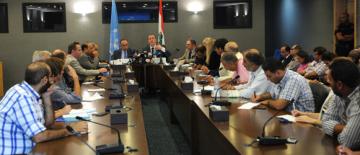
Laying out the main findings of the Survey, Al Dardari said "according to the ESCWA report, in spite of intensifying geopolitical tensions particularly in the Syrian Arab Republic, the Arab region's GDP growth rate is estimated at 4.8 percent in 2012 owing to the growing oil revenues, which reached a historical high in that year. However, an expected gradual decline in crude oil prices due to the weakening demand would impact the region's average growth forecasts: 4.4 percent for 2013 and 4.0 percent for 2014. The weak economic prospects are observed in all sub-regions. The pace of GCC countries' economic recovery stabilizes. Political instability, social unrest and geopolitical tensions continue to affect Mashreq and Maghreb. Deteriorating external conditions such as globally rising funding cost, cause further burdens on Arab Least Developed Countries".
On the status of Women in the Arab region, Al Dardari noted that "significant progress has been made for the past five years increasing women's participation rate in the parliament in the Arab region from 9.1% by end of 2008 to 13.8% in 2013. Meanwhile, female unemployment in the Arab region remains the highest in the world, a rate double that of male unemployment with obvious female labor participation in the services sector".
"The lack of confidence in intraregional business transactions resulted in the segmentation of economies in the region and the loss of regional leverage" he added, "which amplified the seriousness of unemployment throughout the Arab region". "In addressing this pressing issue, the ESCWA report provides a package of short-term reforms to the labor market in order to enable the political actors in the Arab region to reach some sort of social truce that will trigger the structural reforms process. In addition to labour market-specific reform proposals, the ESCWA report emphasizes that the usage of regional leverage, in spirit of regional integration measures, could be effective on the unemployment issue. The proposed measures include Social Value-added Tax (Social VAT) and the promotion of labor mobility within the Arab region and an employment insurance mechanism," Al Dardari said.
In addition to this overall picture of the region's state of economic and social development Al Dardari pointed out that "the ongoing Syrian Crisis is not only negatively affecting neighboring countries' macroeconomic performances but also affecting the Arab region's socio-economic development process", re-emphasizing the importance of further regional integration efforts for the Arab region's balanced and sustainable socio-economic development.
Nahhas
For his part, Lebanese Minister of Economy Nicolas Nahhas pointed out that the importance of the report stems from its focus on human potential as a basis for development and structural reforms, and an essential way to achive them. He expressed hope for the report to be examined within the Economic and Social Council of the League of Arab States.
He added that based on the study, what is needed at present is to adjust with the figures included in it, which point out the main weakness point, and considered that it would have been better to separate comparison between oil-producing and non oil-producing countries, making comparisons more aligned. He also said that it was necessary to address the issue of education within the job market, as there is an incompatibility between the educational system of Arab States and of Lebanon with the real needs of the job market.





